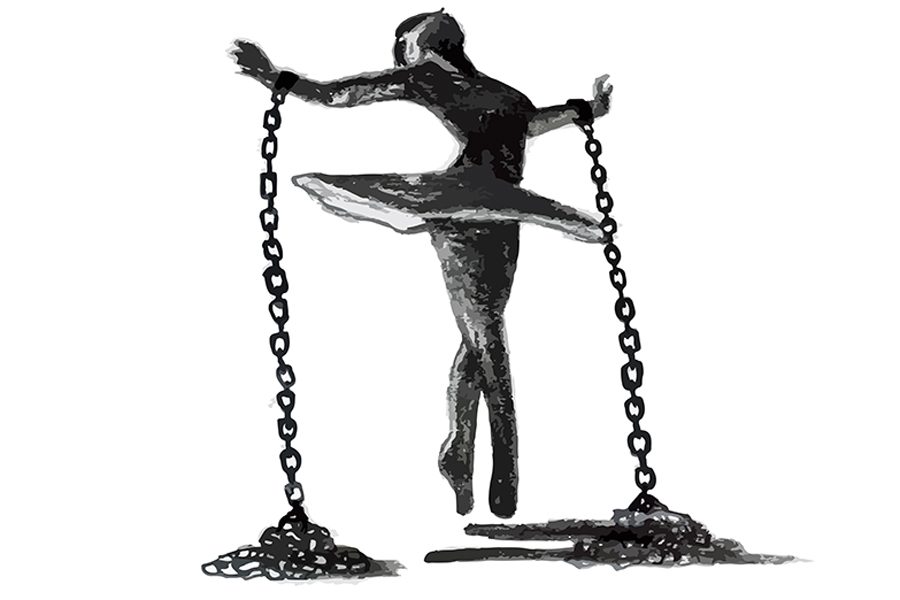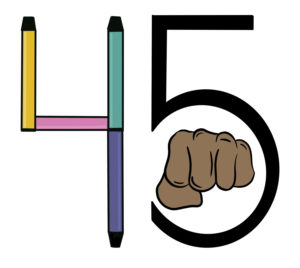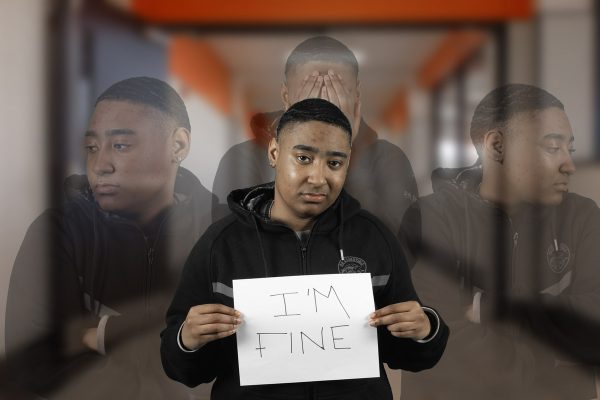Mirror, mirror on the wall
Dancers feel pressure to conform to body standards
Illustration.
December 7, 2016
The fall of 2012 is when I began to notice that my pink, satin pointe shoes started to blacken. The ribbons, normally a vibrant color, had possessed a life of their own and transformed into an ebony vise around my ankles, dragging me down, down through the sinking hole of insecurity. The disease of self pity had plagued me, my mood and above all else, my dancing.
Throughout my life, I have always danced. In the studio, in my kitchen and, yes, I am guilty of occasionally waltzing and leaping through the grocery aisles while my mother hisses at me to behave. For me, dancing epitomized freedom in the simplest, purest form. It is raw emotions on display for all to see, and it is impervious of scrutiny.
Although, as I grew older, I began to notice that dancing was more than finding a beat and moving in synchronization. It was math, precise and accurate in the wildest way. I also became aware of the professional ballerinas. I noted that they all resembled the same shape, but this simple observation had a greater impact than I could have known.
I knew my body was miles away from what is popularly considered graceful and elegant. Whereas the majority of principal dancers are a lithe 5 feet 9 inches, I was a squat 5 feet 4 inches. Unlike them, my legs were not sculpted with marble, and most certainly not solid muscle. They had the hyperextension of a rubber band, a 180 degrees turnout and the flexibility resembling a slinky. This notion brought forth a rude awakening and the birth of an insecurity so large, quitting almost became a harsh reality.
Little by little, I had begun to change from a girl who simply enjoyed adagio music and ballet to a person who dreaded class because a mirror mocked her. My naive perspective of dance had changed. I was no longer the little girl who enjoyed multicolored leotards and fixing her hair into a bun. No, the knowledge that I would never amount to supposed “perfection” was an invisible weight that had molded me into something unrecognizable.
I began to divide up everything. I compared every last detail in my mind, always calculating and leaving no cruel remark unsaid about myself or others.
Over at that bar, were the advanced ones. The dancers who were born with the natural long limbs and high metabolisms. Across the room, were the girls whose moms had forced them to attend class, just for the benefit of claiming their daughters were “graceful.” Although they were careless, however at least they smiled.
Then, at the very back, you had the individuals like myself. Trying to inconspicuously melt into the background, stammering when asked questions and always keeping silent because the feeling of inferiority was overwhelming.
Looking back, I vividly recall my eyes staying glued to the clock, counting down the minutes to the final hour. The hands moved and striked 9, and I was out the door before I could pause and end class with the ritual curtsy in signal of my departure.
Racing to the car, fighting back tears, I scrambled in before my mom could notice something was obviously wrong. How was she to know that when you stand in front of a floor to ceiling mirror for hours on end, you begin to pick out all your flaws? That eventually, your reflection becomes the equivalent of a carnival mirror, twisted and warped?
Comprehension rang clear in my mind, for I finally understood why dancers with eating disorders were common. I grasped the silent, underground competition that is prevalent in the performing world. I understood the fight for acceptance from others.
Eventually, I grew worn and weary from constantly fighting an internal battle. Slowly, I realized that the pain I was dealing with was brought on by myself; it was my own harsh judgements that caused me to stumble. I realized that comparison truly is the root of all evil, and that I didn’t need to be so cruel. It’s okay to be critical, but it is absolutely not okay to tear yourself down to the point of stagnancy and isolation.
Ultimately, all of these conclusions led me to the final truth; all the flaws, blemishes and imperfections are simply a distorted illusion created by the carnival mirror in your mind.






















Jennifer Upchurch • Mar 5, 2017 at 9:18 pm
Women in all walks of life deal with this harsh reality but life is so much sweeter when we realize early that that carnival mirror you spoke of is indeed in our own mind. Go forth, be brave, for you are beautiful.
Donna Morris • Dec 8, 2016 at 6:42 am
This is something many people deal with regardless of age. Always remember that you were created by the hand of God and you are beautiful.